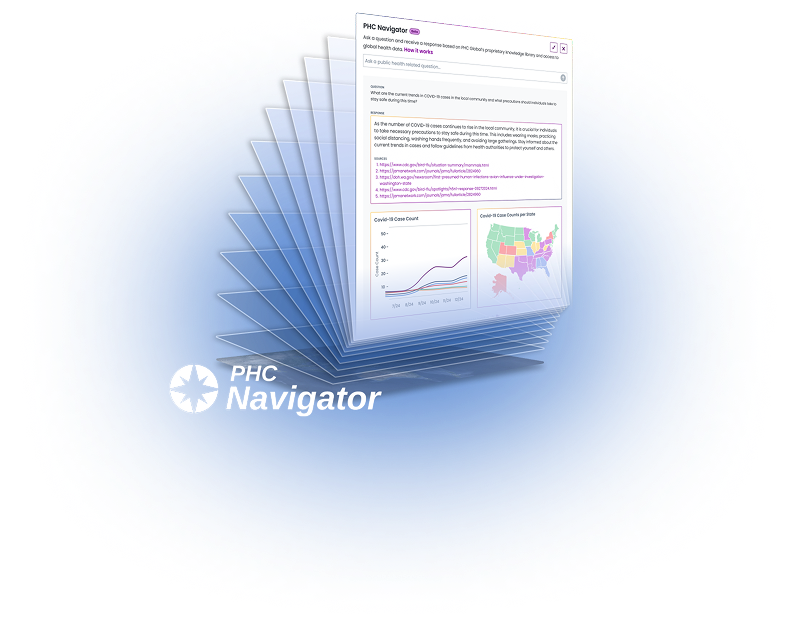Building the Future of Biodefense
Biothreat intelligence to deter and detect natural, accidental, deliberate and novel biological agents.
Biothreat intelligence to deter and detect natural, accidental, deliberate and novel biological agents.
Recommendation: Employees traveling to Colombia should consult their healthcare provider about getting the yellow fever vaccine at least 10 days before departure, and check any domestic vaccination requirements necessary for travel within the country to avoid delays. Organizations should provide flexible work schedules to support employees making vaccine appointments for themselves or family members. Employees can prevent mosquito bites by wearing protective clothing and using insect repellent.
Situation: From 1/1 to 1/20, Colombia reported 14 new yellow fever cases in Tolima, totaling 135 confirmed cases and 53 deaths since 2024. 8 of those cases and 4 of those deaths occurred in the past week (1/14-1/20). Nationally, 155 cases, including 68 deaths, have been recorded since 2024. Media sources reported that recent cases were linked to an outbreak in Chaparral, in southern Tolima. An unspecified number of monkeys died in the same area recently. See PHC alerts on 9/25, 6/17, and 4/17 for earlier info. [Confidence: Very High]
Recommendation: Norovirus is highly contagious. Organizations in South Korea should provide flexible work schedules to allow sick employees (or those with caregiving duties) to stay home until 48 hours after symptoms have stopped. Encourage robust hand hygiene, as the virus is not killed by hand sanitizer.
Situation: South Korean health officials reported that the number of norovirus cases reached the highest level recorded in the past 5 years. In the first 2 weeks of 2026, 548 cases were reported, with infants and young children (0-6 years old) accounting for almost 40% of all cases. Norovirus infection typically occurs from late fall to early spring in South Korea, and infections have been continuously increasing since the first week of November 2025. Health officials urged the public to follow proper hygiene measures, including thoroughly cooking food, washing hands, keeping sick individuals home from school, and disinfecting their surroundings to prevent the spread of infection. [Confidence: Very High]
Recommendation: The hepatitis A vaccine is over 95% effective in preventing disease in people who have received two shots. A single shot of the hepatitis A vaccine can prevent hepatitis A if given within 14 days after exposure. Organizations in Salta, Argentina, should provide flexible work schedules to support employees making vaccine appointments for themselves or family members.
Situation: Salta health officials reported 63 suspected hepatitis A cases, of which 16 were confirmed, and 3 were epidemiologically linked, as of week 53 of 2025. Confirmed cases resided in the departments of General San Martín, Rivadavia, Orán, Rosario de la Frontera, La Caldera, and Capital, with the highest concentration in the northern part of the province. Health officials issued an advisory emphasizing vaccination and maintaining hygiene measures to reduce transmission of the hepatitis A virus. [Confidence: Very High]
Recommendation: Organizations in San Diego County should take measures to ensure rodent-free facilities. Rodent droppings should be cleaned with bleach; wet the soiled area with bleach before wiping up droppings to limit infectious aerosol generation. Employees should always wear gloves and N95 (or equivalent) masks when handling rodents or their droppings.
Situation: San Diego County identified hantavirus in a Western harvest mouse near Los Peñasquitos Ranch House, the 1st hantavirus-positive rodent in 2026. While hantavirus is not uncommon in local wild rodents and human exposure is rare, officials advised residents to take precautions in sheds, garages, and attics and avoid contact with rodents and nesting areas. [Confidence: Very High]
Recommendation: Guillain-Barré syndrome (GBS) occurs when the body's immune system attacks the peripheral nervous system, which can result in ascending paralysis that can affect the ability to breathe in severe cases. GBS is rare, with most cases occurring after infection with a virus or bacteria, such as Campylobacter jejuni, Zika virus, Epstein-Barr virus, among others. Organizations in Neemuch District, Madhya Pradesh, India, should ensure employees have access to clean water, practice good hygiene, and encourage them to seek medical care if they develop symptoms.
Situation: Media sources reported a cluster of GBS in Madhya Pradesh, India. 14 cases were detected in Neemuch District, including 2 deaths. An investigation is ongoing to determine the potential cause. [Confidence: Moderate]
Leverage operational biosurveillance to anticipate and assess biological risks, drive decision-making, and protect mission-critical operations.


PHC Navigator is a biothreat intelligence engine built on expert-curated and proprietary data and models that provides actionable intelligence and insights


© 2025 PHC Global. All rights reserved.
We are excited to show you the PHC Pharos Platform in action!
Enter your contact information and we'll reach out to schedule a demo.